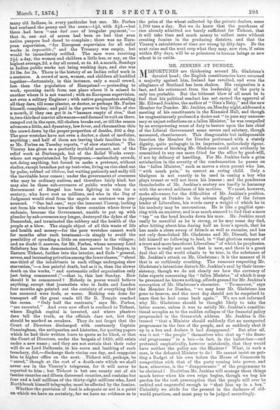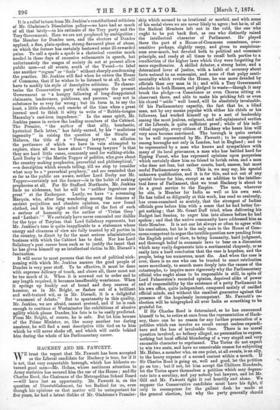MR. JENKINS AT DUNDEE. AIISFORTUNES are thickening around Mr. Gladstone's
devoted head ; the English constituencies have returned a majority against him, Ireland has revolted, and even the allegiance of Scotland has been shaken. His resignation is a fact, and his retirement from the leadership of the party is only too probable. But the bitterest blow of all must be to feel that his political conduct has not earned the approval of Mr. Edward Jenkins, the author of " Ginx's Baby," and the new Member for Dundee. Mr. Jenkins, on Monday night, addressed a meeting of his constituents in the Kinnaird Hall, and though he magnanimously professed a desire not "to pass any unneces- sary or unjust reflections on a fallen Minister," he was compelled by an overpowering sense of duty to bestow upon the late chief of the Liberal Government some severe and salutary, though measured, chastisement. This disagreeable but indispensable function the Member for Dundee performed with a stately dignity, quite pedagogic in its impressive, melancholy rigour. The process of birching Mr. Gladstone could not evidently be committed to any one more fitted for the office by good-will, if not by delicacy of handling. For Mr. Jenkins feels a grim satisfaction in the severity of the condemnation he passes on the "fallen Minister," such as moves a stern parent who has, "with much pain," to correct an erring child. Only a bludgeon is not exactly to be used in caning a boy who plays truant or will not learn his lessons ; and the ponderous thunderbolts of Mr. Jenkins's oratory are hardly in harmony with the avowed mildness of his motives. We must, however, make allowance for the difficulties of Mr. Jenkins's position. Appearing at Dundee in the solemn dignity of the future leader of Liberalism, his words carry a weight of which he in his modesty may be unconscious. He is like a pugilist spar- ring with an amateur, and is as much amazed to find that a mere " tap " on the head knocks down his man. Mr. Jenkins must really be merciful as he is strong, or he may some day find, after hitting about him during half an hour's speech, that he has made a clean sweep of friends as well as enemies, and has not only demolished Mr. Gladstone and Mr. Disraeli, but has left himself no following to lead, in "that glorious summer of a truer and more beneficent Liberalism" of which he prophesies. There is really not much that is new, and there is a great deal that all the world admits to be true, in the substance of Mr. Jenkins's attack on Mr. Gladstone ; it is the manner of it that is so ruthlessly crushing. The rumours respecting Mr. Gladstone's intentions disturb Mr. Jenkins's soul by their incon- sistency, though we do not clearly see how the currency of false reports concerning the " fallen Minister," of which it may be presumed he knows nothing, affords ground for Mr. Jenkins's conception of Mr. Gladstone's character. "To-morrow," says the Member for Dundee, "we may hear Mr. Gladstone has gone to heaven, and the next day should not be surprised to learn that he bad come back again." We are not informed why Mr. Gladstone should be thought likely to take the latter course, unless it was to satisfy Mr. Jenkins's constitu- tional scruples as to the sudden collapse of the financial policy propounded in the Greenwich address. Mr. Jenkins is dis- tressed "that a Minister should suddenly flirt an unexpected programme in the face of the people, and as suddenly shut it up in a box and declare it had disappeared." But after all, was it not " the people" themselves who shut up "the finan- cial programme" in a box—in fact, in the ballot-box—and protested emphatically, however mistakenly, that they would have neither the policy nor the Minister ? What, in such a case, is the defeated Minister to do ? He cannot insist on put- ting a Budget of his own before the House of Commons in competition with that of the party coming into power, and how, otherwise, is the " disappearance " of the programme to be obviated ? Doubtless Mr. Jenkins will manage these things much better when his own reign begins, though we beg his pardon for the rash presumption that the people will ever be unkind and ungrateful enough to "shut him up in a box." Unluckily we abide for the present in the darkness of old- world practices, and must pray to be judged accordingly. fascination, easily into a hard conclusion that the case is hopeless, and the It will occur to most persons that the sort of political nick- people, being too numerous, must die. And when the case is naming with which Mr. Jenkins amuses the good people of over, there is no one who can be trusted to exact retribution Dundee is very poor stuff. To be effective, it must be done more mercilessly, to search more deeply into the causes of the with supreme delicacy of touch, and above all, there must not catastrophe, to inquire more rigorously why the Parliamentary be too much of it. When it is screwed out to order and to official who ought alone to be responsible is still, in spite of any length required, it becomes insufferably wearisome. When Lord Palmerston's recorded opinion, deprived alike of power it springs up freshly out of broad and deep sources of and of responsibility by the existence of a petty Parliament in humour, as in Mr. Bright, or flashes out of a brilliant his own office, quite independent, composed mainly of ossified and well-trained wit, as in Mr. Disraeli, it is a delightful official minds, and without the smallest guarantee against the "ornament of debate." But to spontaneity in this quality, presence of the hopelessly incompetent. Mr. Fawcett's re- Mr. Jenkins, we are afraid, cannot pretend, and if he is rash election will be telegraphed all over India as something to be enough to continue at Westminster the exhibitions of abusive grateful for. agility which please Dundee, his fate is to be easily predicted. If Sir Charles Reed is determined, as he has announced From Mr. Bright, of course, he is safe. But let him beware himself to be, to retire at once from the representation of Hack- of the Prime Minister, or, like many another too daring ney, there can be no reason for any further prosecution of a amateur, he will find a neat descriptive title tied on to him petition which can involve no result except useless expendi- which he will never shake off, and which will rattle behind tura and the loss of invaluable time. There is no moral him during the whole of his Parliamentary career, question involved, no bribery alleged, no personation to expose,



































 Previous page
Previous page